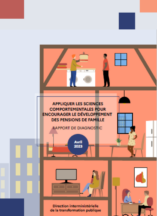This project was conducted in 2022-2023 in collaboration with the Directorate for Government Transformation (DITP). We assisted the DITP’s behavioural science department following a sollicitation from the French Interministerial Delegation for Access to Housing (DIHAL).
A “pension de famille” (“PF”) is a type of social housing in France, specifically designed for individuals facing social or psychological challenges and having limited access to conventional housing programmes. Unlike many other social housing solutions, residents can remain in their PF homes indefinitely. Despite significant government funding, the programme’s expansion faces several barriers : as of December 2022, only 72% of the projected 10 000 new PF spots that should have opened between 2017 and 2022 had actually opened.
The Délégation Interministérielle à l’Hébergement et à l’Accès au Logement (DIHAL) has pinpointed the reluctance of local authorities – particularly city mayors – as a major barrier ; their ultimate approval being an essential requirement for the establishment of new PFs (through the issuance of building permits, for example).
To better understand the barriers faced by local representatives, we conducted a mixed method study (using both qualitative and quantitative methods) involving city mayors as well as key actors in the social housing space (landlords, associations, real estate developers, etc.) to explore representatives’ knowledge of and attitudes towards PF, as well as their past experiences with this type of social housing.
Our research identified 3 key barriers for local representatives:
- A lack of awareness and understanding of PFs and how they work, which could negatively affect their perception of this type of social housing
- Concerns regarding a potential burden on local services (ex: local schools and hospitals) and negative preconceptions about the residents;
- Structural and financial barriers, partly stemming from uncertainty surrounding the costs and funding of a new project.
In light of these findings, several interventions seem promising to increase local representatives’ support of, and engagement with, PFs:
- Rectify their perceptions of this type of housing and of its target population.
- Leverage and draw on the experience of representatives from local authorities that have implemented PFs, drawing on testimonials, objective data, and narratives.
- Empower local representatives, especially to help them identify social housing needs and address potential financial challenges.







